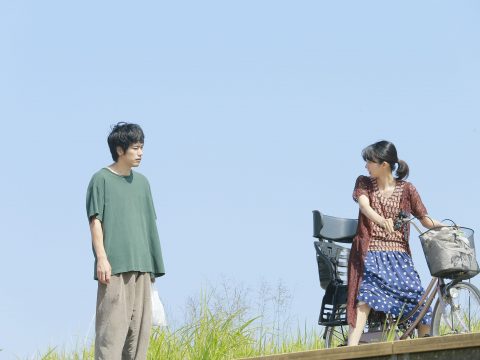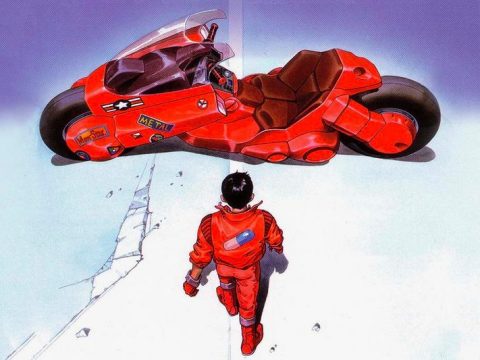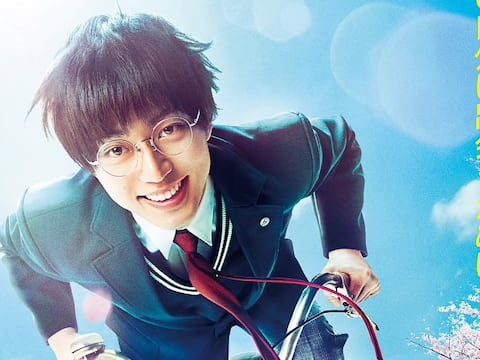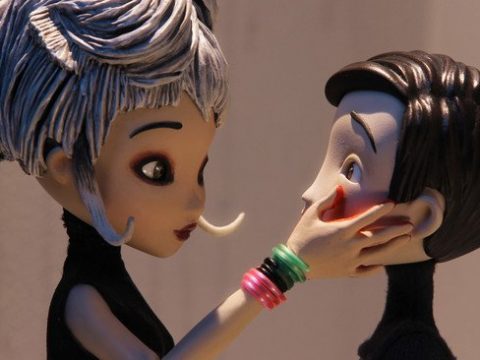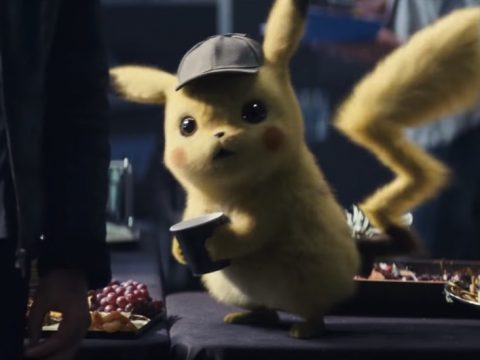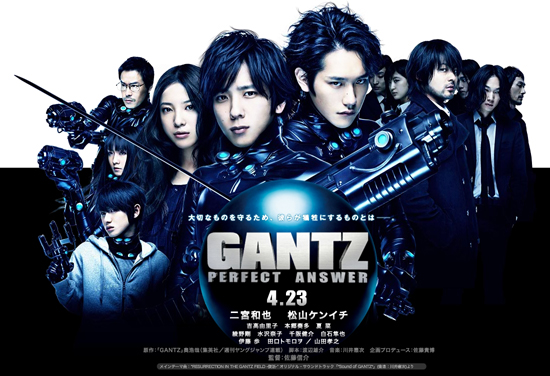
When the first Gantz live-action film hit theaters with a surprisingly wide American theatrical release (which our Dear Leader Patrick Macias covered), the reactions were mixed to say the least. The fact that Hiroya Oku’s bleak world drenched in sex, violence and bucketloads of sarcasm had most of the sarcasm, sex and violence deftly air-brushed out of it left many fans of the original out in the cold. The adaptation had many cursing the forces of Japanese marketing and its sanitizing ways.
However, once getting past the fact that the bad boy anti-hero Kei Kurono (Kazunari Ninomiya) had been transformed into Peter Parker in a black cat-suit and realizing that we wouldn’t be getting nearly as much of Kishimoto (Natsuna) and her curvaceous figure, director Shinsuke Sato and screenwriter Yuusuke Watanabe had crafted an engaging mystery in their own right. The sterile atmosphere was suitably creepy and the story of recently dead people being resurrected to fight literal illegal aliens on earth still maintained some semblance of its original satire and social criticism, albeit watered-down for mass consumption. While perhaps not on par with the scathing amorality of the original, at least it was darker than the usual Japanese action fare and by the end of the first half, the declawed narrative had found its own voice for those who were willing to hear it out.
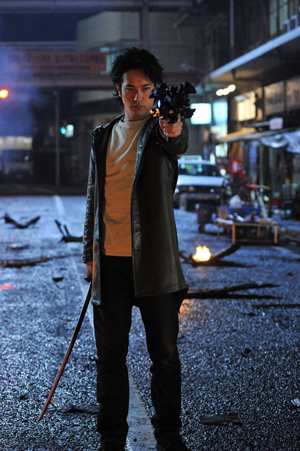 On top of that, the post-credits teaser for the second half promised to actually give some concrete answers to all the ambiguity we’ve witnessed until now. What is the purpose behind the Gantz ball? How will the captives of Gantz get out of their futile situation? What’s the deal with another Kato appearing? Oh yeah, and there’s going to be sword-fighting in front of a burning building with cars being thrown about. Sometimes it’s the little things that get you.
On top of that, the post-credits teaser for the second half promised to actually give some concrete answers to all the ambiguity we’ve witnessed until now. What is the purpose behind the Gantz ball? How will the captives of Gantz get out of their futile situation? What’s the deal with another Kato appearing? Oh yeah, and there’s going to be sword-fighting in front of a burning building with cars being thrown about. Sometimes it’s the little things that get you.
When we last left our heroes, Kurono had just seen Kato (Kenichi Matsuyama) and Kishimoto, his two closest companions in the Gantz game, get skewered by their last target. After a brief recap of this, the second film opens in a time before Kurono was involved in the game, introducing Eriko Ayukawa (Ayumi Ito), an attractive model who wakes up one day with a pocket-sized version of the infamous Gantz ball, much to her horror.
As its big brother, the bite-sized ball spits out cryptic yet caustic text, but instead of giving Eriko strange aliens to kill it’s giving her human targets, which she obeys in the interests of getting out of the nefarious ball’s grasp. Turns out that the final name on her list is Tae Kojima (Yuriko Yoshitaka), who we met in the previous movie as the sweet-natured manga artist who is quietly pining for Kurono. Following Eriko is a detective (Takayuki Yamada) hell-bent on getting to the bottom of the strange incidents.
As fate and plot contrivance would have it, the Gantz team’s latest mission takes them to a speeding train where Tae, Eriko and a small army of black-suited body snatcher aliens have gathered. The result is a slickly done and suspenseful action sequence that also demonstrates that the crew hasn’t completely forgotten the grim trappings of the original comic—no sooner have our heroes been zapped onto a train than the other passengers start taking cell phone pictures… only for the hapless innocents to be mercilessly cut down in a hail of bullets. Making matters even worse is that the Gantz ball is starting to go on the fritz, leading to panic in the group and also to Kurono’s grasp on leadership slipping into an all-out mutiny.
 While running at the same hefty 150 minutes as its predecessor, Gantz Perfect Answer feels like a tighter affair and moves at a faster clip. The first part, with its episodic structure of action/exposition/action/more exposition/unresolved cliffhanger, reminded of the old days when the first few episodes of a TV series would be strung together to create a “movie” sold in the overseas market. Perfect Answer, on the other hand, doesn’t suffer from this thanks in part to being a completely original story, taking only a few scattered cues from the source material. Instead of a host of alien baddies, here we focus exclusively on an extended hunt against one variety of alien and with it a more focused narrative.
While running at the same hefty 150 minutes as its predecessor, Gantz Perfect Answer feels like a tighter affair and moves at a faster clip. The first part, with its episodic structure of action/exposition/action/more exposition/unresolved cliffhanger, reminded of the old days when the first few episodes of a TV series would be strung together to create a “movie” sold in the overseas market. Perfect Answer, on the other hand, doesn’t suffer from this thanks in part to being a completely original story, taking only a few scattered cues from the source material. Instead of a host of alien baddies, here we focus exclusively on an extended hunt against one variety of alien and with it a more focused narrative.
This plays out greatly in its favor in large part because the staff was smart enough to ditch the more otherworldly alien designs in favor of the “Black Suits” and the grief they cause for our heroes. By dealing exclusively with humanoid enemies, the action crew is somewhat freed from the bonds of a less-than-Hollywood budget. Here, the focus is on dynamic choreography, featuring various types of weaponry pitted against each other in various permutations. Guns both modern and futuristic, swords, and good old-fashioned chop-socky—it’s all here on full display. Furthermore, by stripping the CG, it gives the battles a much more visceral, immediate feeling that works as divisions in the ranks start emerging and the Gantz ball finds itself randomly resetting its timer and acting even more erratically than usual.
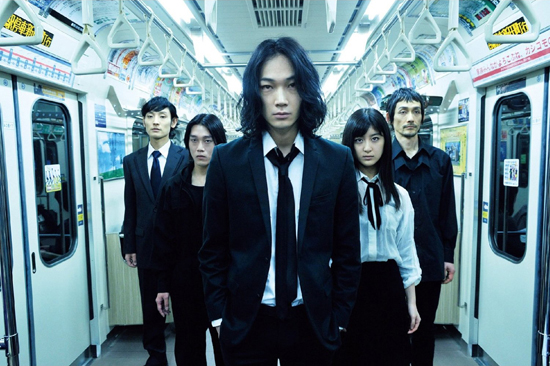
Where the film succeeds as an action movie, however, it stumbles as a drama. The original work, in its best moments, was a gripping if unconventional look at human nature. There are a few flashes of this as the Gantz hunters start to turn their blasters on each other in the name of a chance at survival. Even so, by and large, the dramatic component often falls into cheap melodrama, especially when it comes to the forced romance between Ninomiya’s Kurono and Yoshitaka’s Tae, given how the latter’s portrayal of the shy artist-cum-target is likable and sympathetic enough without needing all the slow-motion crying and shouting of names that we get “treated” to by Ninomiya. Faring slightly better is Matsuyama’s performance as Kato, whose drive for revenge for his murdered kid brother rings true and provides solid motivation for the explosive fight that ensues.
Flaws aside, this is a much more satisfying film than its first part would have suggested. If you think part one was a horrible travesty that compromised Oku’s original vision, then Perfect Answer will do nothing to persuade you otherwise and can be safely skipped. On the other hand, if you accepted the live-action version on its own merits and were curious to see how it all plays out, then this might just be the answer you were looking for.
Fernando Ramos is a Japan correspondent for Otaku USA. His website can be found at www.mroutside.com


